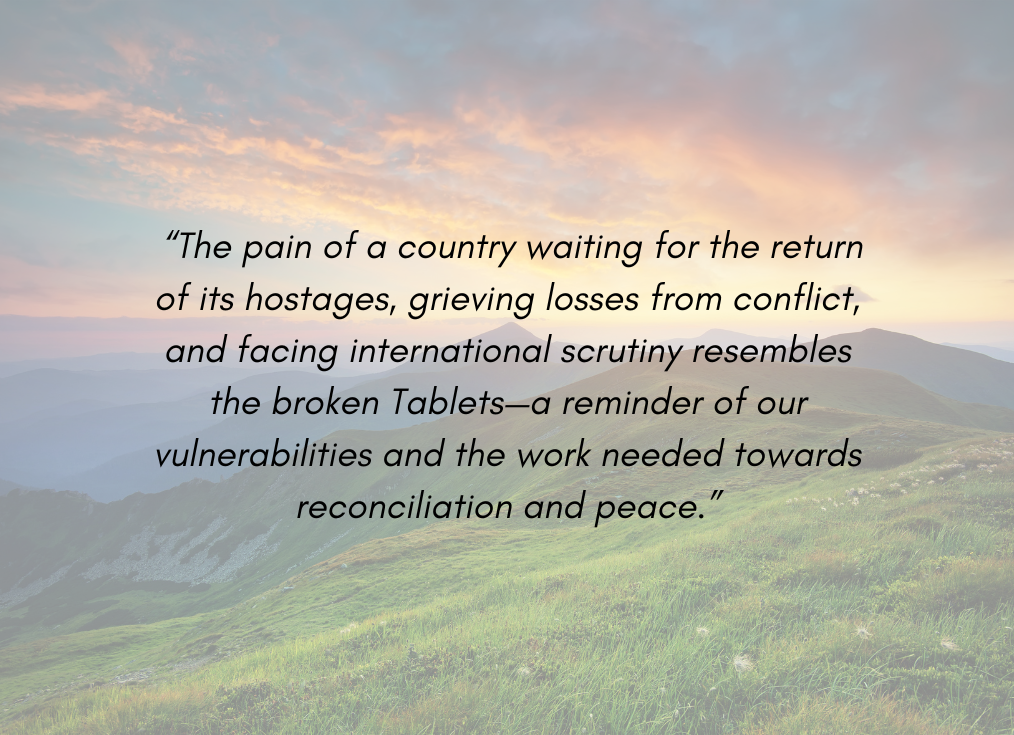Embracing Our Imperfections

March 1, 2024 / 21 Adar 5784
In this week’s Torah portion, Ki Tisa, we encounter the fundamental story of Moses bringing the physical Tablets down from Mount Sinai and encountering the sin of the Golden Calf. In fact, many are not aware that the first set of tablets brought down by Moses were shattered upon witnessing the Israelites dancing and singing to this graven idol.
As I prepared for this week’s column, I could not help but reflect that this biblical narrative is not merely a historical recounting but a timeless lesson, especially as I write this while sitting in a café in Israel overlooking the Mediterranean Sea. Our homeland is emblematic of resilience and beauty amidst daily struggles.
Israel, a model democracy in the Middle East, celebrated its open and free elections for local government this past Tuesday, showcasing the passionate democratic spirit of its citizens. This event, set against the backdrop of a nation still reeling from the wounds of war and the collective yearning for the safe return of the 130 hostages still held captive, encapsulates the dual reality of Israel’s existence. The country’s resilience, the palpable spirit of its people, and the challenges it faces, mirror the duality of human nature and the spiritual journey depicted in Ki Tisa.
…
The shattering of the first Tablets by Moses symbolizes the imperfections inherent in creation and the human condition. It teaches us that sanctity and growth often emerge from the recognition and acceptance of our flaws. The subsequent creation of the second set of Tablets, which resided in the Ark of the Covenant alongside the broken pieces, serves as a potent reminder that acknowledging our frailties is integral to realizing our potential.
Israel’s journey mirrors this biblical lesson. The nation’s enduring spirit, democratic values, and commitment to building a just society amidst scrutiny and adversity reflect a collective striving towards perfection, despite the recognition of inherent imperfections. The pain of a country waiting for the return of its hostages, grieving losses from conflict, and facing international scrutiny resembles the broken Tablets—a reminder of our vulnerabilities and the work needed towards reconciliation and peace.
This duality of human experience—our capacity for greatness despite our flaws—is a call to action. It urges us to acknowledge our weaknesses and errors, not as finalities but as steppingstones towards improvement. It is within the community that we find our environment to highlight potential, fostering relationships that are built on understanding, empathy, and shared goals.
As we reflect on the lessons from Ki Tisa and the resilience of Israel, let us remember that our strength lies in our ability to come together, recognizing that our imperfections do not define us but rather guide us towards greater unity and purpose. The story of the Tablets teaches us that it is only through embracing both our frailties and our strengths that we can forge a path of growth and redemption.
In this spirit, let us strive to improve ourselves, our communities, and our world. Let us engage in acts of kindness, understanding, and collaboration, acknowledging that our collective potential is magnified when we support one another. My weekly closing affirmation not only binds us but propels us forward, towards a future where our imperfections are not barriers but bridges to a more compassionate, understanding, and united existence. Because we are…
Shabbat Shalom.

